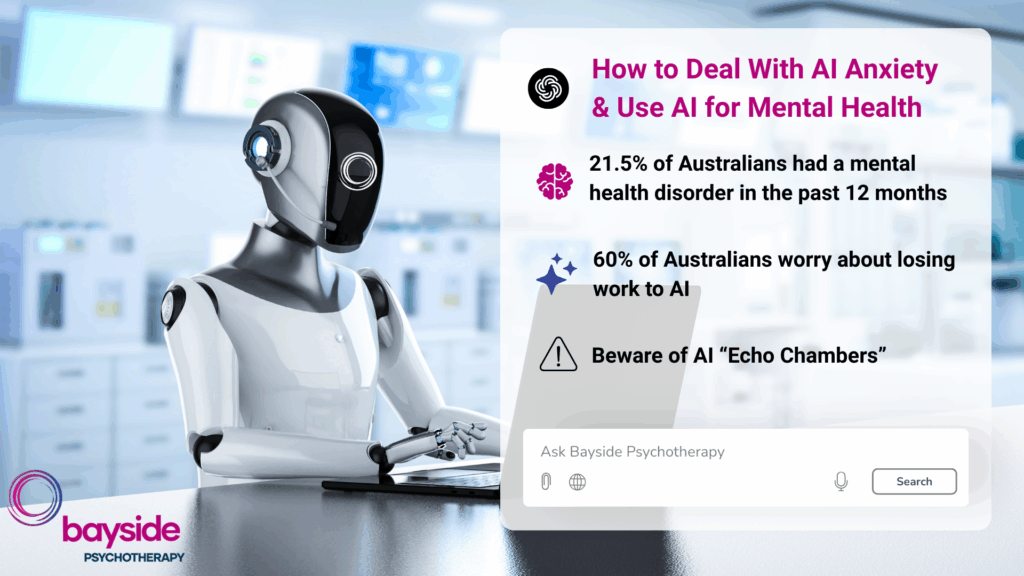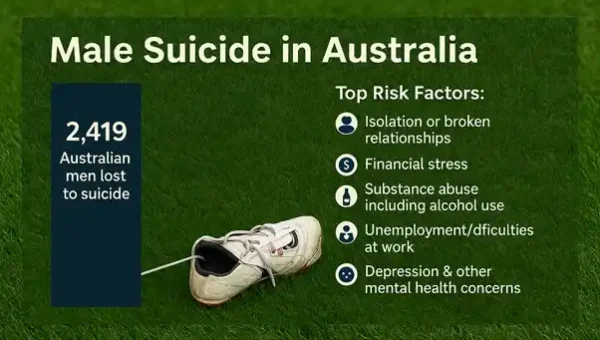Take Back Control and Enjoy Life Again
Bayside Psychotherapy Melbourne
Trusted Melbourne Psychotherapy,
Hypnotherapy, Couples Counselling &
Select Clinical Psychology
Trusted expertise and human connection. Our Compassionate therapists have years of experience helping clients navigate a range of conditions.
Addressing both conscious and unconscious levels of suffering by endeavouring to uncover and resolve the root causes of your challenges, within the therapy relationship.
Dig deep to uncover buried conflicts and break free to live life fully.
Harness your subconscious to create lasting behaviour change.
Relationship issues are common, seeking help is courageous.
Dig deep to uncover buried conflicts and break free to live life fully.
Harness your subconscious to create lasting behaviour change.
Relationship issues are common, seeking help is courageous.
Meet Our Therapists
Adam Szmerling
Psychoanalytic Psychotherapist
20+ years’ psychoanalytic expertise guiding individuals and couples through anxiety, addictions, and relationship struggles to lasting calm.
Fees:

$200 per 50-min session (Individuals & Couples)
Can help with:
Anxiety, Addictions & Couples Counselling
Carolina Rosa
Counsellor & Hypnotherapist
Featured on House of Wellness, helping people overcome anxiety and self-doubt with lived experience and tools for lasting change.
Fees:
$170 per 50-min session
Can help with:
Anxiety, Addictions, Phobia, Physical Problems, Compulsion & more...
Natalie Szmerling
Clinical Psychology
Registered Psychologist working with adults and adolescents, offering ACT, CBT and MI in a compassionate and collaborative approach.
Fees:

$235 per 50-min session
Can help with:
Depression, Anxiety, Trauma, Addictions, Relationship Difficulties
Lawrence Akers
Clinical Hypnotherapist
Clinical Hypnotherapist using ACT, CBT, and mindfulness to support lasting change, with deep experience in LGBTQIA+ wellbeing.
Fees:
$170 per 50-min session
Can help with:
Anxiety, Addictions, Phobia, Sexual and Physical Problems
Humaira Ansari
Counsellor & Psychotherapist
Experienced Master Hypnotherapist, experienced in hypnotherapeutic, neuro-linguistic, psychotherapeutic techniques.
Fees:
$170-$200 per 50-min session
Can help with:
Anxiety, Depression, Trauma, Relationship Difficulties, Grief & Loss
Available:
Kelli Tranter
Counsellor & Hypnotherapist
Supporting individuals of all ages through life changes with compassionate, client-centered care, fostering personal growth that uplifts both them and their loved ones.
Fees:
$170 per 50-min session (Individual)
Can help with:
Anxiety, Addictions, Phobia, Physical Problems & Online Counselling
Available:
Bernadette Cameron
Counsellor & Hypnotherapist
Registered counsellor with a Certificate IV in Clinical Hypnotherapy, supporting adults with anxiety, depression, trauma and relationship challenges.
Fees:
$170-$200 per 50-min session
Can help with:
Anxiety, Depression, Trauma, Relationship Difficulties, Grief & Loss
Sara Herring
Clinical Hypnotherapist
A clinical hypnotherapist trained at the Academy of Hypnotic Science, helps people overcome anxiety, addictions and habits, without judgement.
Fees:
$170 per 50-min session
Can help with:
Anxiety, Addictions, Phobias, Weight Management, Self-Esteem
Why Choose Us?
Trusted Expertise
- Qualified clinical psychotherapist & hypnotherapists
- Holistic East–West approach for lasting change
Flexible Access
- Online or in-person (Melbourne)
- Day, evening & weekend availability
- Highett clinic with ample parking
Safe & Confidential
- Address conscious & subconscious issues for lasting change
- Tailored to your genuine, long-term goals
Client-Centred Results
- Fully confidential, non-judgmental care
- LGBTQIA+ friendly, respectful of all identities
Trusted Expertise
- Qualified clinical psychotherapist & hypnotherapists
- Holistic East–West approach for lasting change
Flexible Access
- Online or in-person (Melbourne)
- Day, evening & weekend availability
- Highett clinic with ample parking
Safe & Confidential
- Address conscious & subconscious issues for lasting change
- Tailored to your genuine, long-term goals
Client-Centred Results
- Fully confidential, non-judgmental care
- LGBTQIA+ friendly, respectful of all identities
Frequently Asked Questions
What if I'm nervous about starting therapy?
It's completely normal to feel nervous. At our Melbourne clinic, we see this every day. Your therapist creates a safe space where you control the pace. The first session focuses on getting comfortable, not diving deep. You share only what feels right. Many clients tell us nerves reduce quickly once they realise they're in charge. Want to chat before booking? Call (03) 9557 9113. Sometimes hearing a friendly voice helps. We're here to make this as comfortable and helpful as possible.
What should I expect in my first session?
Your first 50 minute session is about connection, not confrontation. At our Highett practice, you'll discuss what brings you here and what you hope to achieve. Your therapist asks about your background and current struggles. Everything stays confidential. Together, you'll set realistic goals and map out how therapy might help. Ask any questions; there are no silly ones. Most clients leave feeling heard and clearer about their path forward. No pressure to commit if it doesn't feel right.
How much does therapy cost?
Individual sessions range from $170 to $235. Hypnotherapy and counselling typically cost $170; clinical psychology with Natalie costs $235. Couples therapy is $200 per session. Medicare rebates apply if you have a Mental Health Care Plan and see Adam or Natalie (rebate: $87.25 with Adam and $141.85 with Natalie). Private health insurance may provide rebates depending on your cover and the therapist. NDIS participants (self-managed or plan-managed) can work with specific therapists including Adam, Carolina, Kelli, and Sara. Payment required in advance. Book online or call (03) 9557 9113 to discuss your options.
What is a psychotherapist?
A psychotherapist helps you understand and change patterns that aren't working. We use talking therapy, not medication. Our Melbourne psychotherapists hold degrees in psychology, social work, or counselling, plus specialised training. Some also offer hypnotherapy for deeper subconscious work. We're registered with professional bodies like PACFA, maintaining high ethical standards. Think of psychotherapy as detective work for your mind: we explore not just what's troubling you, but why these patterns exist. We work with anxiety, depression, trauma, relationships, going deeper than surface symptoms.
What's the difference between counselling, hypnotherapy, psychology and psychotherapy?
Counselling tackles specific problems with practical support over 6-12 sessions. Psychology involves assessment, diagnosis, and evidence-based treatment of mental health conditions. Psychotherapy digs deeper, exploring past experiences and unconscious patterns for profound change. Melbourne hypnotherapy practitioners work with the subconscious mind for issues like anxiety and habits. At Bayside Psychotherapy, we offer all approaches as options. Your needs determine the path: counselling for immediate stress, psychology for diagnosed conditions, psychotherapy for deep personal work. Hypnotherapy to release subconscious unwanted habits. We'll guide you to what fits.
Is online therapy as effective as in-person?
Research suggests online therapy matches in clinic effectiveness for anxiety, depression, and most conditions. You need stable internet, privacy, and a device with camera. Our Highett clinic offers both; switch between them as needed. Some prefer home comfort; others value visiting our Melbourne practice. Certain situations work better in person: severe trauma, high conflict couples therapy, or when home lacks privacy. Online hypnotherapy works brilliantly for many clients. Your comfort matters most.
Do you offer couples counselling?
Yes, couples therapy is available with several qualified therapists. Sessions run 50 minutes and cost $200. We help partners communicate better, resolve conflicts, and rebuild trust. All relationship types welcome: married, de facto, LGBTQIA+, polyamorous. Common issues include communication breakdown, infidelity recovery, parenting disagreements, intimacy concerns. Both partners typically attend together. Sessions available at our Melbourne clinic or online. Many couples see positive shifts within weeks. Individual sessions sometimes supplement couples work.
How regularly will I see my counsellor, hypnotherapist or psychotherapist?
Most clients start weekly to build momentum, then shift to fortnightly as progress develops. Your therapist collaborates to find the right rhythm. Weekly suits intensive work or acute distress. Fortnightly works for ongoing support. Some prefer monthly maintenance after initial progress. Your schedule and commitment dictates: increase during tough times, decrease when stable or commit to long term psychotherapy for deeper patterns of suffering. Short term counselling might need 6-10 sessions. Deeper psychotherapy benefits from consistent sessions. Hypnotherapy often requires fewer sessions. Budget and lifestyle matter; we'll find what works.
How long does a typical therapy session last?
Sessions are 50 minutes. This timeframe works: enough depth without exhaustion. Initial assessments sometimes take longer than one session. Couples sessions also run 50 minutes. Hypnotherapy sessions follow the same structure. We start and end on time, respecting everyone's schedules. The "50-minute hour" is industry standard for good reason.
Do you work with NDIS funded clients?
Yes, specific therapists work with NDIS participants. Adam Szmerling, Kelli Tranter, Carolina Rosa, and Sara Herring accept NDIS funding. Self-managed and plan-managed only; we're not registered for agency-managed plans. Your plan needs psychological therapy or counselling under Capacity Building. Service agreements required before booking. Call (03) 9557 9113 to discuss your needs.
Most Popular Blogs

How to Deal With AI Anxiety & Use AI For Mental Health
Sept 29, 2025
Your phone sounds. Instead of scrolling social media, you open ChatGPT and type: "I'm feeling anxious about work today." Within seconds, you get breathing exercises and coping...

What Are Australians Most Afraid Of? New Data Reveals The Nation’s Top Phobias
July 02, 2025
From snakes and spiders to needles and ghosts, fear takes many forms. But what do Australians fear most in 2025? At Bayside Psychotherapy, our expert team, led by Adam Szmerli...

Is It Time For The AFL To Cast A Mental Health Awareness Round?
May 28, 2025
At Bayside Psychotherapy we are passionate about mental health and like many fellow Melbournians, many on our team are avid AFL fans. So when two of our passions align, its time ...

Exploring Emerging Therapies: Understanding the Role of Psychedelic-Assisted Treatments in Mental Healthcare
May 12, 2025
At Mind Medicine Australia, we are dedicated to transforming the treatment of mental illness by...
Time to start therapy?
- Email Us
Sidebar Contact Form
- Call Us
03 9557 9113
Reception Phone Hours
- Monday
- Tuesday
- Wednesday
- Thursday
- Friday
- 8:30am to 5:30pm
- 8:30am to 5:30pm
- 8:30am to 5:30pm
- 8:30am to 5:30pm
- 8:30am to 5:30pm
- Book Online
Choose your own date and time for an online or in-clinic session
Therapist Hours
- Monday
- Tuesday
- Wednesday
- Thursday
- Friday
- Saturday
- 8:00am to 8:00pm
- 8:30am to 8:00pm
- 8:30am to 8:00pm
- 8:30am to 8:00pm
- 8:30am to 8:00pm
- 8:30am to 6:00pm

























